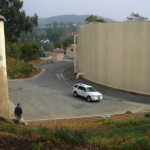Suburban Water Systems (SWS) needed to perform a structural analysis and evaluation of the existing concrete reservoir (R-1) at Plant 129 in West Covina, CA. The plant, located off South Lark Ellen Ave, was comprised of two separate above-ground reservoirs, a newly constructed pump station (2005), and associated piping. Although there were no visible signs of structural damage or failure, SWS requested PacRim to perform a structural analysis of the existing concrete reservoir to determine if the removal of soil around the perimeter of the reservoir will have any long-term negative impacts to the structural integrity.
PacRim made an engineering judgment and determination of the as-built material properties for the purpose of structural analysis. Assessing the material structural parameters required determining a statistical or empirical “aging” reduction factor to apply to the material strength of the 60-year-old reservoir. Based on current guidelines for assessing similar existing structures and materials, the reduced structural material strength was used in verifying the adequacy of structural member capacities based on computed demands of the structural analysis.
PacRim analyzed the existing structure including the service and dynamic loading conditions. Dynamic loading included convective and impulsive inertial forces created during a seismic event and was determined using methodology outlined in ANSI/AWWA D-110 standard and site geotechnical information. PacRim identified potential deficiencies related to the reservoir’s global stability due to overturning and sliding, structural member, and foundation capacity and approximate remaining service life.
Upon the completion of the structural evaluation study in Task B, PacRim provided retrofit alternatives to provide stabilization of the reservoir and increase its overall lifespan. The service life of the structure can be increased by renewing regions of the structure under maximum distress.


